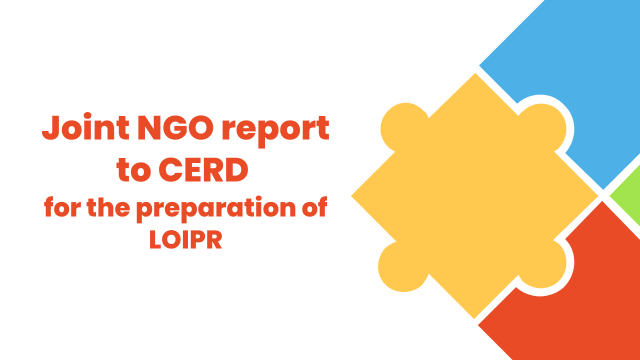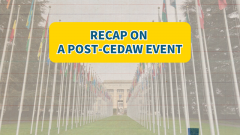Transitional justice in Sri Lanka (HRC30, 2015, OS)
September 16, 2015
IMADR delivered its oral statement on “Transitional justice in Sri Lanka” at the 30th session of the Human Rights Council. Whole text can be read below or downloaded here. ![]()
———
IMADR Oral Statement: 30th session of the Human Rights Council
Item 3: Clustered Interactive Dialogue with the Special Rapporteur on the promotion of truth, justice, reparation and guarantees of non-recurrence
15 September 2015
Thank you Mr. President,
We welcome the Special Rapporteur’s advisory visit to Sri Lanka early this year.
In follow-up to his visit, we wish to share our concerns on transitional justice processes in Sri Lanka. Despite his emphasis on the need to facilitate participation of victims, women affected by the conflict and civil society organisations, such participatory measures are yet to take place. As the Special Rapporteur observed, the previous domestic mechanisms failed to generate confidence of the affected communities. It has caused the lack of trust in the Government, including that of the Attorney-General’s Department to sufficiently address human rights violations. Therefore, victims and civil society organisations are unanimously raising the issue of credibility of purely domestic mechanisms and the involvement of the Attorney-General’s Department in such processes.
In spite of the political changes this year, communities in the North and East continue to be affected disproportionately by surveillance, military presence, internal displacement and the Prevention of Terrorism Act. This has resulted in the lack of confidence of those communities in the new Government.
Furthermore, many of the promises made by the Government to the High Commissioner in this February to advance human rights and address past violations are partially or not at all fulfilled. This clearly shows the Government’s inability to take swift and effective measures with this regard.
Against this backdrop, we urge the Government of Sri Lanka to take following actions to advance transitional justice processes in line with international human rights standards:
- Incorporate crimes against humanity, war crimes and genocide into Sri Lankan law;
- Ratify relevant international treaties including the International Convention for the Protection of All Persons from Enforced Disappearance;
- Repeal the Prevention of Terrorism Act (PTA);
- Appoint a panel of international experts to assist in the development of transitional justice processes;
- Ratify the Rome Statute of the International Criminal Court;
- Release the reports of all the domestic commissions appointed by the previous regime to facilitate public discussions and debates as well as to affirm the right to information; and
- Immediately resume consultations with civil society, human rights defenders, victims and their families throughout the country to ensure participatory and holistic processes.
We also request the Government to invite the Special Rapporteur and other relevant special procedures to assess the progress and provide expertise for fulfilment of own international obligations.
Thank you Mr. President.





